|
|
|
Sort Order |
|
|
|
Items / Page
|
|
|
|
|
|
|
| Srl | Item |
| 1 |
ID:
095911
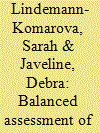

|
|
|
|
|
| Publication |
2010.
|
| Summary/Abstract |
Most analyses of civil society development in contemporary Russia tend to focus geographically on the city of Moscow and substantively on political elites, elections, and human rights violations. To the extent that the 141 million Russian citizens are mentioned, their experiences are usually represented by a handful of Muscovite human rights leaders. These leaders are certainly part of Russia's civil society, as are the many Russian citizens who have been victimized by the brutal war in Chechnya and other actions in the Caucasus. However, what of the other Russians? The story of the remaining 141 million matters and is yet untold.
|
|
|
|
|
|
|
|
|
|
|
|
|
|
|
|
| 2 |
ID:
142994
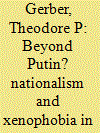

|
|
|
|
|
| Summary/Abstract |
The role of nationalism within the Russian public is an under-examined but potentially important aspect of the crisis surrounding Russia's annexation of Crimea and its continuing involvement in eastern and southern regions of Ukraine. As commentators have sought to comprehend President Vladimir Putin's motives, many have asserted or assumed that such actions enjoy tremendous Russian public support. Indeed, public opinion polls from Russia indicate that Putin's popularity soared in the wake of the Crimean annexation and that large majorities have supported the government's policies in Ukraine, sympathizing with the Kremlin's negative portrayals of U.S. motives and actions.1 However, it is not clear whether this wave of public support is a fleeting “rally around the flag” phenomenon or the result of an organic, deeper tendency toward nationalism and xenophobia in the Russian public.
|
|
|
|
|
|
|
|
|
|
|
|
|
|
|
|
| 3 |
ID:
163142
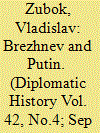

|
|
|
|
|
| Summary/Abstract |
Vladimir Putin's announcement to run for another term makes him the most durable leader in Russia's recent history. Some think of Putin as "the new Brezhnev," who might die in office many years from now. But is it fair to compare Putin to Leonid Brezhnev? Can the Soviet past provide any lesson's for Russia's present and future? What should the United States expect for Putin?
|
|
|
|
|
|
|
|
|
|
|
|
|
|
|
|
| 4 |
ID:
094204
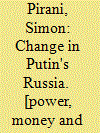

|
|
|
|
|
| Publication |
London, Pluto Press, 2010.
|
| Description |
xi, 228p.Hbk
|
| Standard Number |
9780745326917
|
|
|
|
|
|
|
|
|
|
|
|
Copies: C:1/I:0,R:0,Q:0
Circulation
| Accession# | Call# | Current Location | Status | Policy | Location |
| 054738 | 947.08/PIR 054738 | Main | On Shelf | General | |
|
|
|
|
| 5 |
ID:
105268
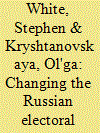

|
|
|
| 6 |
ID:
119866
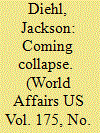

|
|
|
| 7 |
ID:
193262
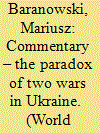

|
|
|
|
|
| Summary/Abstract |
The central thesis of this commentary focuses on the paradox of two wars occurring in parallel with Russian aggression in Ukraine. It is not just that—in addition to military action—there is a geopolitical tsunami and its consequences in the form of a possible food crisis, mass migration, or an already open energy war. The paradox relates to the fact that a potential Ukrainian victory could have adverse effects on the welfare of European countries as a consequence of the embargo on Russian hydrocarbons and the need to replace them (assuming there is no return to the ancien régime before the Russian aggression of February 24, 2022). The defeat of the Ukrainians, on the other hand, could lead to a so-called “new opening” and a gradual return to the import of Russian energy resources (which, although they will not obtain the pre-war volume, will provide energy stability for Europe in a period of diversifying contracts and developing investments in renewable energy sources).
|
|
|
|
|
|
|
|
|
|
|
|
|
|
|
|
| 8 |
ID:
098069
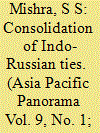

|
|
|
| 9 |
ID:
146006
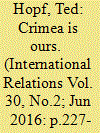

|
|
|
|
|
| Summary/Abstract |
Russia could have annexed Crimea anytime in the last 25 years. The fact that it did so only in March 2014 is a puzzle. I argue that the predominant discourse of Russian national identity by 2014 made the annexation of Crimea and military intervention in eastern Ukraine both thinkable and natural to Moscow. A history of the discursive terrain of Russia from 1992 to 2014 shows how Russia’s national identity has evolved over the years, both in response to Western inactions or actions and domestic developments. But Russian identity is not a sufficient explanation for Russian behavior in Ukraine. For that, we must pay attention to the event itself: Western support for the Maidan protestors, Western failure to adhere to the February 2014 agreements reached with Moscow on a transitional government in Ukraine with Yanukovych at its head and new elections in November, the presence of disgruntled Russians in Ukraine, and perhaps most important, over a decade of US unilateralism in foreign affairs.
|
|
|
|
|
|
|
|
|
|
|
|
|
|
|
|
| 10 |
ID:
148822
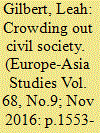

|
|
|
|
|
| Summary/Abstract |
There is considerable debate about the impact of the 2006 NGO Law and related Kremlin policies on social organisations in Russia. This article uses interviews with members of organisations focusing on human rights, women, and youth to assess the effects of these policies on civil society. It finds that groups that are critical of the regime have been systematically pushed out of the public sphere and supplanted by groups that are either neutral to, or in favour of, the regime. This finding has implications for the future development of Russian civil society and demonstrates a way that non-democratic rule has been ‘upgraded’ in Russia.
|
|
|
|
|
|
|
|
|
|
|
|
|
|
|
|
| 11 |
ID:
082930
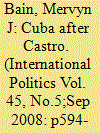

|
|
|
|
|
| Publication |
2008.
|
| Summary/Abstract |
The focus of this article is the relationship that developed between Russia and Cuba in the years since the disintegration of the Soviet Union. The reasons for both the deterioration in relations in the early 1990s and their improvement from the middle of the decade will be analysed. A variety of different causes are important for both but significantly the improvement in the relationship has taken place when globally the neoliberal economic model has been pre-eminent. This article will argue that chief among the reasons for closer Russian-Cuban relations has been the neoliberal economic model.
|
|
|
|
|
|
|
|
|
|
|
|
|
|
|
|
| 12 |
ID:
141322
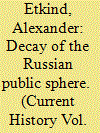

|
|
|
|
|
| Summary/Abstract |
[A]lthough the level of political control in Putin’s Russia is not much different from what was typical for the late Soviet period, the means of control have changed entirely.” Second in a series on public spheres around the world.
|
|
|
|
|
|
|
|
|
|
|
|
|
|
|
|
| 13 |
ID:
138398
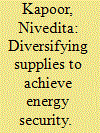

|
|
|
|
|
| Summary/Abstract |
As India’s economic growth keeps pace at a high rate, energy consumption and demand too has increased rapidly. Being a country that is not very rich in oil and gas reserves, the dependence of India on imported sources of energy is only bound to increase if it is to keep fuelling its growth story.
|
|
|
|
|
|
|
|
|
|
|
|
|
|
|
|
| 14 |
ID:
137530
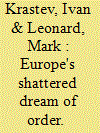

|
|
|
|
|
| Summary/Abstract |
Until recently, most Europeans believed that their post–Cold War security order held universal appeal and could be a model for the rest of the world. This conviction was hardly surprising, since Europe has often played a central role in global affairs. For much of the last three centuries, European order was world order—a product of the interests, ambitions, and rivalries of the continent’s empires. And even during the Cold War, when the new superpowers stood on opposite sides of the continent, the central struggle was between two European ideologies, democratic capitalism and communism, and over control of the European lands in between.
|
|
|
|
|
|
|
|
|
|
|
|
|
|
|
|
| 15 |
ID:
115069
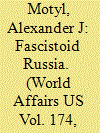

|
|
|
|
|
| Publication |
2012.
|
| Summary/Abstract |
The massive demonstrations that rocked Russia in the aftermath of the Duma elections of December 4, 2011, surprised everyone, including most Russians. But they shouldn't have. The conditions for such an upheaval have been ripening as a result of the growing power and decrepitude of Putinism. It is likely that popular mobilization will continue, and that the regime's days may be numbered.
|
|
|
|
|
|
|
|
|
|
|
|
|
|
|
|
| 16 |
ID:
190848
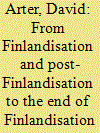

|
|
|
|
|
| Summary/Abstract |
Putin’s full-scale invasion of Ukraine on 24 February 2022 triggered a process that saw Finland abandon its traditional policy of military non-alignment and, together with Sweden, submit an application for NATO membership. Finland’s history of Finlandisation came up routinely in the parliamentary debates on a NATO application and there was a broad consensus that NATO membership would mark the end of Finlandised Finland. Accordingly, this article has a dual aim. First, it seeks to chart the main lines of post-war Finnish foreign and security policy since the late 1960s using Finlandisation and post-Finlandisation as the organising concepts. Second, it explores why, ultimately, Finland applied for NATO membership in May 2022. Putin’s invasion of Ukraine, it is suggested, engendered a psychosis of fear among the Finnish public, stirring collective memories of the loss of land, lives and livelihood at the hands of unprovoked Soviet aggression in the 1939–40 Winter War and the fear of history repeating itself at various tension points in Finno-Soviet relations thereafter. Strikingly, until 24 February a clear majority of politicians and the Finnish public opposed NATO membership.
|
|
|
|
|
|
|
|
|
|
|
|
|
|
|
|
| 17 |
ID:
145263
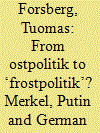

|
|
|
|
|
| Summary/Abstract |
Germany's relationship with Russia has historically been one of the most crucial in shaping Europe's fate. Despite radical transformation in the nature of European Great Power politics, it continues to be pertinent from the perspective of today's world. Germany's willingness to establish good relations with the Soviet Union in the late 1960s—its emphasis on economic relations and cooperation instead of political disagreements—prepared the ground for the end of the Cold War and German unification twenty years later. Germany's basic policy towards Russia remained broadly unchanged despite German unification and changes in the domestic political coalitions and leadership, sometimes against political expectations. In the European context, Germany's attitude towards Russia created the backbone of EU–Russia relations. During 2012–13, however, the continuity in Germany's policy towards Russia was seen as having come to an end. Political twists came to the fore and the atmosphere was loaded with tensions, made worse by the Ukrainian crisis. This article reviews the recent, alleged changes in Germany's policy towards Russia during the Merkel era. It asks two basic questions: first, whether Germany's policy really has changed and if it has, what are the theoretical tools that give us the best potential understanding of these changes? The article argues that the policy has changed, but not as dramatically as made out by some headlines. Moreover, the article suggests that a key element in analysing the degree of change in Germany's policy towards Russia is neither the external power relations nor domestic politics and related changes in the prevailing interpretation of national interest, though these are important too, but the interaction between the leaders and foreign policy elites.
|
|
|
|
|
|
|
|
|
|
|
|
|
|
|
|
| 18 |
ID:
128588
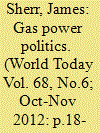

|
|
|
| 19 |
ID:
092327
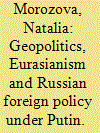

|
|
|
|
|
| Publication |
2009.
|
| Summary/Abstract |
Although the "rise" of geopolitics and Eurasianism to discursive prominence within the Russian post-Soviet foreign policy discourse has been widely discussed in the literature, their relegation to the margin of the said discourse a decade later has passed largely unnoticed. Only a few attempts to account for this fall from grace exist, and their proponents agree that Eurasianism had become a spent force in Russian politics by the time of President Putin's ascendancy to power because it failed to sustain a coherent foreign policy, particularly following Russia's failure to restore its pre-eminence in the post-Soviet space. On the level of practical geopolitical reasoning, therefore, Eurasianism is reduced to geopolitics, i.e. the politics of spheres of influence and hegemonic spatial control, while Eurasian identity construction is dismissed as unconvincing, strategic and self-serving. However, this article attempts to provide an alternative explanation for the decline of Eurasianism under Putin - the one that focuses on the attempt within post-revolutionary and post-Soviet Eurasianism to theorise both a unique identity and a credible ideology, i.e., what Eurasianists themselves termed "ideocracy". Therefore, a classification of Russian geopolitical thinking is provided according to the different ways in which the intellectual legacy of classical Eurasianism is being invoked and appropriated. Both 'traditionalist' and 'modernist' geopoliticians invoke Russia's Eurasian identity in order to answer the practical question 'how?' - how Russia should preserve its territorial integrity and enhance its international standing. Proponents of 'civilisational' geopolitics, on the contrary, employ the ideational resources of classical Eurasianism in order to answer the question 'what?': what is Russia in the post-Cold War world. It is argued that the answer to this latter question - given that two possible attempts to apply Eurasian ideocracy to post-Soviet conditions have developed - is a necessary step to answering the question "why?": why Eurasianism has been effectively sidelined under Putin turning into a metaphorical dog that did not bark.
|
|
|
|
|
|
|
|
|
|
|
|
|
|
|
|
| 20 |
ID:
192615
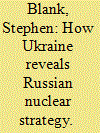

|
|
|
|
|
| Summary/Abstract |
If we examine the role played by nuclear weapons in Russia's war against Ukraine, we find that they play an offensive role in Russian strategy. The deterrence mission is as much intended to free Russia's hands for conventional war on its periphery as it is intended to prevent a nuclear first strike from the West. Indeed, the evidence of exercises etc. strongly points to a readiness for attacking Western sea-lines of communication in the Atlantic were a Western response to come as a result of the attack on Ukraine. Similarly, the potential for nuclear threat exists in the vicinity of the Black Sea as shown by Russian exercises in advance of the war there and in the Eastern Mediterranean. Those exercises reveal that Moscow's power projection policy into the Levant and beyond is also part of its deterrence strategy and has amongst its objectives protecting the Black Sea as a Russian lake, an inherently offensive posture. Therefore Russia's nuclear strategy in this war and in general stand revealed as offensive ones which the West must reckon with.
|
|
|
|
|
|
|
|
|
|
|
|
|
|
|
|
|
|
|
|
|